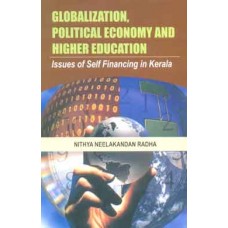Globalization, Political Economy and Higher Education : Issues of Self Financing in Kerala |
Author :
Nithya Neelakandan Radha
ISBN: 9789380615189
Year: 2016
Pages: 469
Binding: HB
Publisher Name: Madhav Books
ISBN: 9789380615189
Year: 2016
Pages: 469
Binding: HB
Publisher Name: Madhav Books
Price:
Price in Dollar: $60
INR 1,750.00
Price in Dollar: $60
Qty:
Globalization as a concept has been used in both positive and negative way by different people in different situations. However, there is an agreement among all theorists that globalization has had enormous impact on societies at economic, political, and cultural levels. Indeed, policy making in education is much affected by the phenomenon of globalization. Traditionally, policy has been produced within the authority of the nation-state. However, over the last two decades globalization has resulted in the strengthened influence in policy terms of international organizations such as the UN, the World Bank, and OECD. The World Bank Report of 1994 on Higher Education urged countries to reduce their universities' overdependence on a single (state) source of funding; and to diversify towards more money from tuition fees, consultancies and donations. One reason that supports the growth of private higher education is the declining capacity of public institutions to meet the increasing demand for tertiary education. Political economy is the interplay between economics, law and politics, and how institutions develop in different social and economic systems, such as capitalism, socialism and communism. The key driver of the global transformation in higher education is a long-term shift in the underlying political economy that shapes costs, revenues, markets, and priorities. The emerging environment of higher education is more turbulent, more competitive, and more threatening. Recent trends indicate a growing public apathy for higher education, followed by reduction in public expenditure and unreliable and unregulated growth of private higher education led to Laissez Faireism in higher education. Currently, education is considered as a tradable commodity. Its sale and purchase is no longer to be fixed by the state, but solely determined by the laws of free market. It shows that the private entrepreneurs are solely concerned about investment in higher education with the sole purpose of making profit. Commercialization of education is depriving the poor meritorious students for getting qualitative education at the cost of state. Equality of educational opportunity in higher education is considered essential because higher education is a powerful tool for reducing or eliminating income and wealth disparities. If higher education is fully privatized and priced at its full cost, only those who can afford will buy it. Education creates a divide between the educated and the uneducated or the semiliterate. This divide makes a society unequal. This empirical work is an attempt to analyze the key problems in self financing professional education sector of Kerala. During the past fifteen years, Kerala witnessed mushrooming growth of self financing professional colleges and it led to various issues. The purpose of this work was motivated by unsolved problems in self financing education in Kerala.
Write a review
Your Name:Your Review: Note: HTML is not translated!
Rating: Bad Good
Enter the code in the box below:




